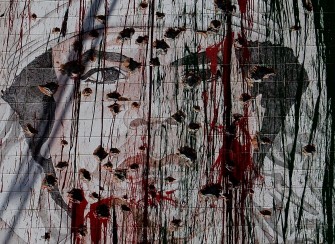Arab states that ousted their dictators got a financial shot in the arm Saturday with promises of tens of billion of dollars to help their rocky transformation into modern democracies.
G8 rich nations and institutions including the World Bank, the IMF, regional banks and the Arab Monetary Fund pledged nearly $80 billion in aid and loans over the next two years, doubling the amount promised earlier this year.

French Finance Minister Francois Baroin announced the massive increase at a Group of Eight finance ministers' meeting in Marseille, where close by up to 1,000 demonstrators gathered to protest against austerity measures.
The money is earmarked to support reform and help new governments weather short-term economic instability in the wake of popular uprisings that began in Tunisia and toppled its strongman leader before spreading to Egypt and Libya.
"We are facing an historical transformational moment, and while there are downsides, there is enormous enthusiasm," International Monetary Fund chief Christine Lagarde told reporters here.
Jordan and Morocco, which have not faced popular revolutions but whose kings have promised steps towards deeper democracy, joined the so-called Deauville Partnership after the initial members Egypt and Tunisia.
Representatives from the four states were in Marseille on Saturday to explain to donors and lenders how they planned to relaunch their economies and to hear what help they can expect from the world's major economic powers.
Officials from Libya's new government -- whose fighters have taken control of most of their country but are still battling remnants of strongman Moamer Kadhafi's forces -- were also in the southern French city as observers.
Libya is not yet a formal member of the Deauville Parternship -- named after the French town that hosted the G8 meeting in May -- but has been promised it will be added to the list soon.
Its transitional government got a boost Saturday when the IMF said it now formally recognises it, paving the way for the fledgling administration to benefit from the IMF's financial help.
"The fund stands ready to help the authorities through technical assistance, policy advice, and financial support if requested, as they begin to rebuild Libya's economy," IMF chief Lagarde said.
"The new authorities will also need to quickly restore oil production to generate revenues, stabilise the currency, re-establish a payment system, introduce sound public financial management, and start reforms to foster a more inclusive and sustainable growth for the benefit of all Libyan citizens."
IMF staff are ready to travel to Libya for an initial fact-finding mission as soon as security conditions allow, Lagarde said.
This week both Egypt and Tunisia -- which are due to hold elections before the end of the year -- said they had so far received little or nothing despite the grand promises made by the G8 in Deauville.
Tunisia's Finance Minister Jalloul Ayed told the Financial Times that his country had received not a penny, while his Egyptian counterpart said only $500 million had come through.
"We understand this frustration," an official from a major financial institution said Saturday in Marseille. But the donors and lenders "need to know who (in the new Arab administrations) they are talking to."
France's Baroin said that while no deadline for delivering the financial aid had been drawn up, it should be released "as soon as possible."
"These are not just words," he said. "This is concrete, it will be fast."
Officials from Turkey, Saudi Arabia, Kuwait, Qatar and the United Arab Emirates were also at the meeting in Marseille.
Before turning their attention to the Arab Spring, the finance ministers from Britain, Canada, France, Germany, Italy, Japan, and the United States on Friday vowed tough measures Friday to get the global economy back on track.
But they were short on detail and admitted the problems were so complex that a unified response was impossible.
The gathering came as stock market turmoil returned to the United States and Europe after the resignation of the European Central Bank's top economist fuelled fears over the continent's debt crisis.
Up to 1,000 protesters gathered a few hundreds metres away to demonstrate against austerity plans under the slogan "People first, not finance."
Unions, left-wing party members and about 40 associations were represented in the crowd.
"It's important to unite during the G8, because the decisions being made to fight the crisis are going against the people. Other ways are possible," said French CGT union official Patrice Ehrhart
























